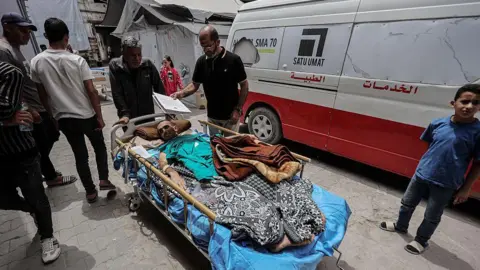**Israel’s Ground Operation Against Hamas Intensifies Amid Ceasefire Talks**
In a significant escalation of military activity, Israel has reportedly initiated extensive ground operations in Gaza amidst persistent negotiations for a potential ceasefire. The operation, known as Operation Gideon’s Chariot, is designed to target Hamas, the governing entity within Gaza, and aims to free hostages captured during the hostilities that erupted following a surprise attack by Hamas on southern Israel on October 7, 2023, which resulted in substantial casualties.
On Sunday evening, the Israeli Defense Forces (IDF) issued a stark evacuation order for several regions, emphasizing the urgency of the situation as imminent attacks were anticipated. This military incursion has impacted various areas in Gaza, notably the cities of Khan Younis and northern towns such as Beit Lahia and Jabalia, where the conflict has already led to significant civilian casualties. Reports suggest that at least 67 people have lost their lives and hundreds more have been injured in the last 24 hours, according to the health ministry controlled by Hamas.
The ongoing bombardment has further strained Gaza’s emergency services, leading to critical breaches in public healthcare. The al-Mawasi camp, designated as a “safe zone” for displaced individuals, experienced an overnight attack resulting in numerous fatalities and injuries, highlighting the precarious situation for civilians seeking refuge from the violence.
In the southern city of Khan Younis, residents describe the living conditions as dire, with one local woman highlighting severe shortages of essential supplies such as flour, gas, and food. The Israeli military’s recent communications have framed the situation as a final warning, encouraging civilians to move towards designated shelters as they prepare “powerful strikes” against identified areas used for launching rockets.
Amidst this environment of heightened military engagement, the humanitarian situation continues to deteriorate. Reports from medical facilities indicate that three public hospitals in northern Gaza are no longer operational due to the intensive airstrikes, exacerbating an already critical healthcare crisis. Specifically, the Indonesian Hospital in Beit Lahia has come under fire, with staff reporting the presence of IDF tanks at their premises. This incursion has left approximately 55 patients, including immobilized individuals who cannot evacuate following prior attacks, at significant risk.
In conjunction with military actions, negotiations for a ceasefire are underway in Qatar, characterized by contrasting perspectives from both Israeli and Hamas negotiators. Israeli Prime Minister Benjamin Netanyahu’s administration has reiterated its commitment to secure the release of hostages while conditioning any ceasefire on the disarmament of Hamas and the expulsion of its operatives.
However, a senior Hamas representative has expressed frustration over the apparent lack of progress in negotiations, asserting that no substantial advancements have been made due to “continued Israeli intransigence.” Hamas has indicated a willingness to release all Israeli hostages in a single exchange, contingent upon a comprehensive ceasefire agreement, a proposal that the Israeli side has resisted.
The conflict has led to a humanitarian disaster, with growing fears of famine affecting Gaza’s 2.1 million inhabitants. The blockade imposed by Israel has significantly limited access to food and medical supplies, raising alarms from various humanitarian agencies about the health and wellbeing of the population.
As the hostilities persist, the consequences for both sides remain severe. Israeli military actions against Hamas are being justified as necessary for national security and the liberation of hostages, while the collateral damage, particularly to civilian infrastructure, has drawn international scrutiny and condemnation. Over 53,000 Palestinians have reportedly been killed since Israel’s military campaign resumed, and ongoing airstrikes illustrate the profound and tragic humanitarian impact of this prolonged conflict.
In conclusion, the escalation of military action in Gaza amid fragile ceasefire negotiations underscores the complexity and dire nature of the ongoing Israel-Gaza conflict, further complicating the plight of civilians trapped in a relentless cycle of violence.



